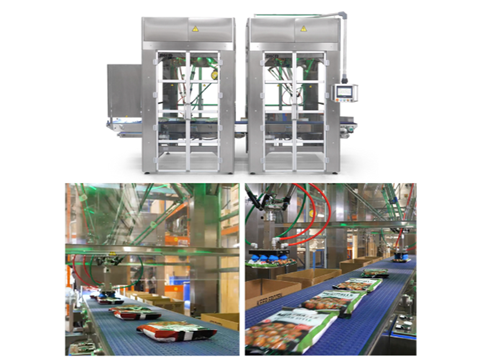
Paxiom Group company ValTara has launched the PKR-Dual Delta Robot, its pick-and-place case packing cell designed for efficient, versatile, and low-cost packing processes for a range of packages.
The solution involves two Delta robots working together to pick and place products into cases at speed. Whereas other case packing systems can be ‘complex and expensive’, this robot is designed for easy use, minimal footprint, and affordability for companies of any size.
ValTara hopes that the PKR-Dual Delta Robot will unlock versatility and efficiency for customers by negating the need for high investments and avoiding an overcomplicated design.
Reportedly, the system can handle bags, pouches, cartons, trays, and a range of other packaging products – making it applicable to various different manufacturers and industries, according to Paxiom Group.
“We are excited to introduce the PKR-Dual Delta Robot pick and place case packing cell to the market,” says Nicholas Taraborelli, vice president of Paxiom. “This system represents the latest in packaging technology, and we are confident that it will provide our customers with the speed, accuracy, and efficiency they need to stay competitive in today’s fast-paced manufacturing environment.”
The PKR-Dual Delta Robot pick-and-place case packing cell is now available from ValTara SRL.
In similar news, ABB Robotics expanded its industrial SCARA portfolio with the IRB 930 pick-and-place robot last December. Three variants are available for handling 12kg and 22kg payloads, with the latter said to increase throughput by 10% by handling several heavy workpieces at once.
Back in February, Proseal revealed its automated CDS Case De-Stacker, which de-stacks cases and delivers them to a case packing machine. Set to save operators the task of manually handling and loading, the solution aims for maximum efficiency, speed, and user safety during the case packing process.
Shawpak has also revealed a single-piece-flow system for medical devices constituting thermoform lines integrated into robot cells. Intended to reduce work-in-progress and handling, the ten machines claimed to package almost 1.5 million devices every 24 hours and only claimed to require two operators per shift.
If you liked this story, you might also enjoy:
How are the top brands progressing on packaging sustainability?
Sustainable Innovation Report 2024: Current trends and future priorities
Reuse vs. single use – which is better for the environment?
The ultimate guide to global plastic sustainability regulation














No comments yet